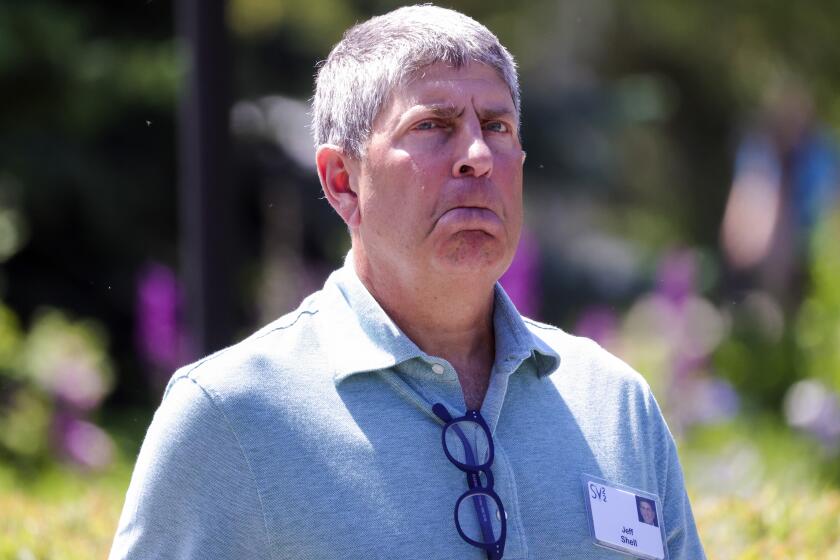Comcast CEO Brian Roberts calls Jeff Shell departure ‘a tough moment’

NBCUniversal Chief Jeff Shell’s sudden departure, triggered by a sexual harassment investigation, has shaken parent company Comcast Corp.
“Obviously, a tough moment,” Comcast Chief Executive Brian Roberts said Thursday morning to open the Philadelphia cable and entertainment giant’s first-quarter earnings call with Wall Street analysts.
Roberts’ remark at the start of what otherwise would have been an upbeat presentation, trumpeting Comcast’s solid financial performance and the blockbuster start for Universal’s “The Super Mario Bros. Movie,” underscored the company’s embarrassment — and challenges.
Comcast must pick up the pieces after Shell, who had been one of Roberts’ trusted lieutenants for 19 years, hastily departed.
The NBCUniversal chief’s ouster followed the investigation into a sexual harassment complaint made against him by a longtime Middle East correspondent for CNBC, Hadley Gamble. The journalist’s attorney in London confirmed earlier this week that Gamble made the harassment report against Shell, which launched the investigation that led to his ouster.
Comcast, in regulatory filings, said it had hired an outside law firm to look into the matter after receiving the complaint that Shell “engaged in inappropriate conduct with a female employee, including allegations of sexual harassment.” In a Securities & Exchange Commission filing Monday, Comcast said: “During the investigation, evidence was uncovered that corroborated the allegations.”
Gamble made the sexual harassment report about a month ago. The company terminated Shell’s contract and does not plan to pay him a severance package, according to people familiar with the matter but not authorized to comment.
“The investigation into Mr. Shell arose from a complaint by my client of sexual harassment and sex discrimination,” said a lawyer for CNBC journalist Hadley Gamble.
Comcast President Mike Cavanagh has taken over the leadership of Shell’s senior team.
During Thursday’s call with analysts, Cavanagh suggested that moving on from the Shell scandal should not be too difficult.
The media company includes businesses managed by proven leaders, including at the Universal theme parks; the Los Angeles-based movie studio, which has built its animation business into a juggernaut; the NBC broadcast network and cable channels, including USA, Bravo, CNBC and MSNBC, and the Peacock streaming service.
“The Super Mario Bros. Movie,” for example, has surpassed $890 million in global box office receipts since its April 5 release. That included $444 million in U.S. ticket sales, according to Box Office Mojo.
“Job No. 1 for me is to settle things down,” Cavanagh said. “Frankly, I don’t think the business is going to miss a beat.”
NBCUniversal CEO Jeff Shell resigns, saying he had an ‘inappropriate relationship with a woman at the company.’ His last day is Sunday.
Cavanagh, a Comcast veteran for nearly eight years, said he expects to oversee the NBCUniversal team for a meaningful stretch.
“Think of me as being here for a while,” Cavanagh said during the call.
He also made it clear that Shell did not run the business by himself.
“The strategies were developed by the entire leadership team,” Cavanagh said. “Brian [Roberts] mentioned what a great a team we have across a diverse collection of businesses — parks, studios, TV, streaming services, news, sports. Strategies are put together by those teams of leaders, obviously, in conjunction with the ultimate leader, and then with Brian and myself. So we’ve been deeply involved for a long, long time.”
He told analysts not to expect a shift in business strategy.
One looming issue is Comcast’s handling of its expected exit from the Hulu joint venture with Walt Disney Co. Comcast owns 33% of the pioneering streaming service and agreed nearly four years ago to sell its stake to Disney for about $9 billion.
Since then, Wall Street has soured on the losses media companies have incurred creating programming to build robust streaming services and Disney Chief Bob Iger has shown less enthusiasm for developing general entertainment for Hulu.
Some analysts wonder whether Comcast will rethink its commitment to sell its stake in Hulu and instead merge that service with the NBCUniversal streaming platform, Peacock.
Comcast said Peacock grew its customer base to 22 million subscribers in the first quarter, up more than 60% from the same time a year ago.
Peacock revenue jumped 45% to $685 million in the quarter, reflecting strong ad sales.
However, the streaming bird posted a pre-tax loss of $704 million in the quarter — significantly more than the year-ago period. Comcast had previously told analysts to expect nearly $3 billion in Peacock losses this year.
The Universal theme parks and film unit recorded strong quarters.
Theme parks revenue soared nearly 25% to $1.95 billion. Universal Studios Hollywood opened a Super Mario Bros. attraction during the January-March quarter. The unit’s pre-tax earnings increased 46% to $658 million.
Studios’ revenue inched up almost 2% to nearly $3 billion. The unit released “Puss in Boots: The Last Wish” and horror film “M3GAN,” during the quarter.
The NBCUniversal television division declined nearly 21% in revenue to $6.2 billion, due to difficult comparisons for the year-earlier period, which included results from NBC’s broadcast of the Winter Olympics from Beijing and last year’s Super Bowl. That unit earned $880 million in the quarter, down 25%.
Despite losing 614,000 cable TV subscribers, Comcast beat analyst expectations on its first-quarter earnings.
Its shares jumped 7% to more than $39 in early morning trading.
Overall, the company generated $29.7 billion in revenue, a decline of 4%. Net income attributable to Comcast increased 8% to $3.83 billion.
Thursday represented the company’s first earnings report under a corporate structure that folded the NBCUniversal businesses into a new “content and experiences” segment.
More to Read
Inside the business of entertainment
The Wide Shot brings you news, analysis and insights on everything from streaming wars to production — and what it all means for the future.
You may occasionally receive promotional content from the Los Angeles Times.













